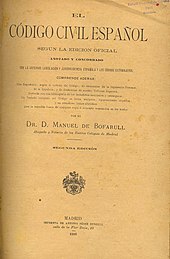Civil Code of Spain
| Civil Code | |
|---|---|
 | |
show
Long title | |
| Enacted | 24 July 1889 |
The Civil Code of Spain (Spanish: Código Civil), formally the Royal Decree of 24 July 1889 (Spanish: Real Decreto de 24 de julio de 1889) is the law that regulates the major aspects of Spanish . It is one of the last civil codes in Continental Europe because of the sociopolitical, religious and territorial tensions that dominated 19th-century Spain. The code has been modified numerous times and remains in force.
Structure[]
The structure of the Civil Code is heavily inspired by the French Civil Code of 1804. It is made up of 1976 articles.
- Preliminary Title. Of legal norms, their application and efficacy (articles 1 to 16).
- Book I. Of persons (articles 17 to 332).
- Book II. Of goods, of property and of their modifications (articles 333 to 608).
- Book III. Of the different ways of acquiring property (articles 609 to 1087).
- Book IV. Of obligations and contracts (articles 1088 to 1975).
- Article 1976 is a repeal provision.
- 13 transitional provisions.
- 4 additional provisions.
See also[]
External links[]
Categories:
- Spanish law